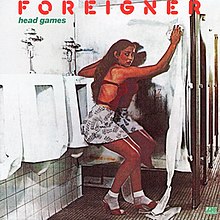
“Urgent” started with what sounded like Led Zeppelin’s “Rock N’ Roll” riff slowed down and shot through massive reverb. Then came Lou Gramm’s “urgent” vocals. Instead of a guitar solo there was wailing sax delivered by Soul legend Jr. Walker. A killer track.

Also, “Foreigner 4” had the ultimate guitar-destiny song “Juke Box Hero.” It was inspired by guitarist Mick Jones’ experience playing in Johnny Hallyday’s backing band when they were on the same bill as The Beatles in Paris. The song tells the tale of a young lad who can’t afford to get into the show but hears “that one guitar” through the walls. That inspires him to buy a second-hand guitar and eventually become (drum roll please) a “Juke Box Hero.”
Prior to “Foreigner 4,” the group’s high-water mark, Foreigner had undergone a major pairing down. Starting as a six-man group. There were three Americans and three Brits, so no matter where they went somebody was a foreigner, hence the name.

In three years, starting in ‘77, they released three successful albums. Their self-titled debut was followed by “Double Vision” and “Head Games” (pictured). During this period disco was pervasive. Rod Stewart and even the Rolling Stones tried their hand at finding the disco magic. Not Foreigner. With songs like “Double Vision,” “Hot Blooded” and “Cold As Ice” they were clearly an alternative to the dance wave.
By ‘80 both multi-instrumentalist Ian McDonald and keyboardist Al Greenwood had split. They were not replaced. That obviously changed the group’s sound. However, Jones, a former member of Spooky Tooth, was smart enough to seek outside help when needed. Tom Dolby added keyboards on “4.”

The keyboard drenched ballad “Waiting For A Girl Like You” was such a hit (though it didn’t equal the unique sounding “Urgent”) that Foreigner recorded it again for their follow-up album “Agent Provocateur.” Only this time they called it “I Want To Know What Love Is.” This track employed the talents of Thompson Twin Tom Bailey, Jennifer Holliday and a full-blown choir.
On “Inside Information” they went to the ballad well for a third time and called it “I Don’t Want To Live Without You.” It was an obvious step down and reflective of the decline in the quality of material and performance from “4.”
Jones was a perfectionist and that drove Gramm up the wall. Doing the takes over and over and over again could take the life out of song.
Eventually, Gramm left for a moderately successful, if short-lived, career. Jones continued with a new lead singer but Foreigner never matched earlier accomplishments… even when Jones and Gramm reunited in the early ’90s.
###







